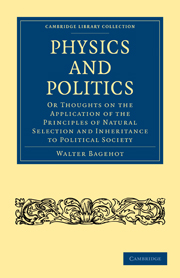 Physics and Politics
Physics and Politics V - THE AGE OF DISCUSSION
Published online by Cambridge University Press: 05 July 2011
Summary
The greatest living contrast is between the old Eastern and customary civilisations and the new Western and changeable civilisations. A year or two ago an inquiry was made of our most intelligent officers in the East, not as to whether the English Grovernment were really doing good in the East, but as to whether the natives of India themselves thought we were doing good; to which, in a majority of cases, the officers who were the best authority, answered thus: ‘No doubt you are giving the Indians many great benefits: you give them continued peace, free trade, the right to live as they like, subject to the laws; in these points and others they are far better off than they ever were; but still they cannot make you out. What puzzles them is your constant disposition to change, or as you call it, improvement. Their own life in every detail being regulated by ancient usage, they cannot comprehend a policy which is always bringing something new; they do not a bit believe that the desire to make them comfortable and happy is the root of it; they believe, on the contrary, that you are aiming at something which they do not understand—that you mean to “take away their religion;” in a word, that the end and object of all these continual changes is to make Indians not what they are and what they like to be, but something new and different from what they are, and what they would not like to be.’
- Type
- Chapter
- Information
- Physics and PoliticsOr Thoughts on the Application of the Principles of Natural Selection and Inheritance to Political Society, pp. 156 - 204Publisher: Cambridge University PressPrint publication year: 2010First published in: 1873


